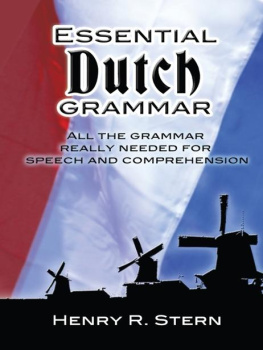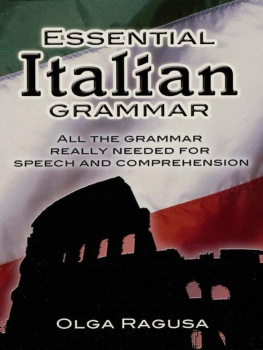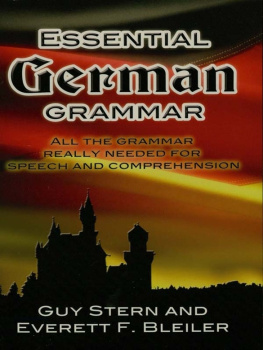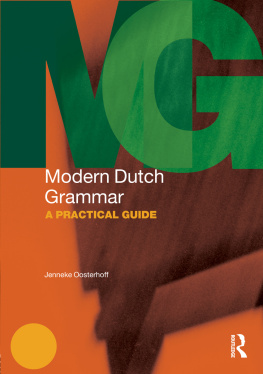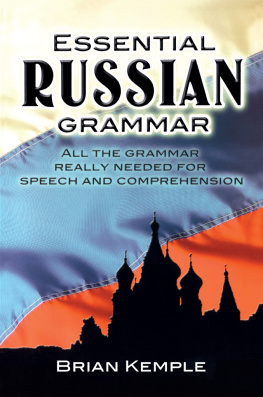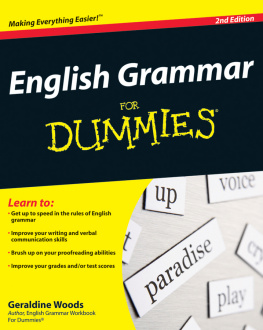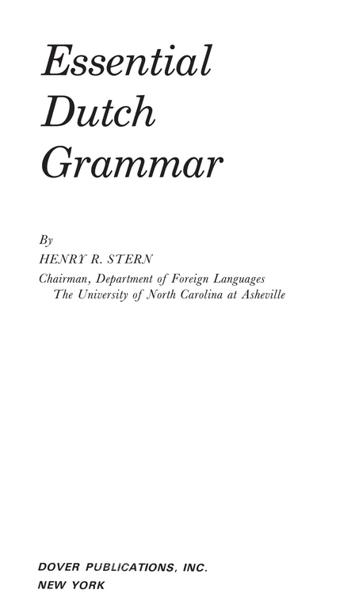Copyright 1984 by Dover Publications, Inc.
All rights reserved.
Essential Dutch Grammar is a new work, first published by Dover Publications, Inc., in 1984.
The Essential Grammar series is prepared under the editorial supervision of R. A. Sorenson.
Stern, Henry R.
Essential Dutch grammar.
Includes index.
1. Dutch languageGrammar19502. Dutch languageText-books for foreign speakersEnglish. 1. Title.
INTRODUCTION
Essential Dutch Grammar is based on the assumption that you plan to spend a limited number of hours studying Dutch grammar and that your objective is simple everyday communication. This book is not a condensed outline of all aspects of Dutch grammar. It is a series of hints to help you use more effectively and with greater versatility phrases and vocabulary that you have already learned.
How to Study Essential Dutch Grammar
If you have already studied Dutch in a conventional manner, you can use this book as a refresher by glancing through all of it first and then selecting those areas on which you wish to concentrate.
If you have never studied Dutch grammar, then the following suggestions will be helpful:
- Master several hundred useful phrases and expressions such as you will find in any good phrase book or in a recorded language course. You will understand the suggestions contained in Essential Dutch Grammar more easily after you have achieved this basic working knowledge of Dutch. The purpose of this book is to enable you to gain greater fluency once you have learned phrases and expressions, not to teach you to construct sentences from rules and vocabulary.
- Read through Essential Dutch Grammar at least once in its entirety. Dont be concerned if anything is not immediately clear to you. What may appear discouragingly difficult at first will become easier as your studies progress. But the first reading is necessary to acquaint you with terms and concepts peculiar to Dutch grammar. Learning what these terms and concepts are will help you to improve your comprehension of Dutch and to use more freely the expressions you already know. As you use Dutch and hear it spoken, many of its grammatical patterns will become familiar to you. Essential Dutch Grammar helps you to discover these patterns so that you can use them.
- Go back to this book periodically. Sections which seem difficult or of doubtful benefit at first may prove extremely useful later.
- For the most part, the book follows a logical order, taking up the major divisions of grammar in sequence. You will do best to follow this order. However, some students learn best when they study to answer an immediate question or need (e.g., how to form the comparative; how to conjugate the verb to be, etc.). If you are one of these students, turn to the section that interests you. But read through the entire section, rather than just an isolated part. Individual remarks, taken out of context, are easily misunderstood.
- Examples are given for every rule. It is helpful to memorize these examples. If you learn every example in Essential Dutch Grammar, together with its literal translation, you will have encountered the basic difficulties of Dutch and studied models for their solution.
- You cannot study Dutch systematically without an understanding of its grammar, and the use and understanding of grammatical terms is as essential as a knowledge of certain mechanical terms when you learn to drive a car. If your knowledge of grammatical terms is weak, read the Glossary of Grammatical Terms (p. 95) and refer to it whenever necessary.
In every language there are many ways to express the same thought. Some constructions are simple, others more difficult. During your first experiments in communication, use a simple construction. You may ultimately wish to master a more sophisticated way of expressing yourself. Be satisfied at first with the simplest.
As you begin to speak Dutch, you will become aware of the areas in which you need the most help in grammar. If you have no one with whom to speak, speak mentally to yourself. In the course of a day see how many of the simple thoughts youve expressed in English you are able to turn into Dutch. This kind of experimental self-testing will give direction to your study of grammar. Remember that you are studying this course in Dutch not to pass an examination or to receive a certificate, but to communicate with others on a simple but useful level. Essential Dutch Grammar is not the equivalent of a formal course of study at a university. Although it could serve as a supplement to such a course, its primary aim is to help the adult study on his own. Indeed, no self-study or academic course or series of courses is ever ideally suited to all students. You must rely on and be guided by your own rate of learning and your own requirements and interests. Essential Dutch Grammar makes self-study easier.
If this or any other grammar tends to inhibit you in speaking Dutch or in using what you have learned through phrase books or conversation courses, curtail your study of grammar until you feel it will really assist rather than hinder your speaking. Your objective is speaking, and you can learn to speak a language without learning its grammar. But because of its systematic approach, grammar is a short-cut to language learning for those who feel at home with it. The fundamental purpose of Essential Dutch Grammar is to help you by eliminating hit-or-miss memorization.
SUGGESTIONS FOR VOCABULARY BUILDING
- Study words and word lists that answer real and preferably immediate personal needs. If you are planning to travel in the near future, your motivation and orientation are clear-cut and a recorded language course or a good travel phrase book will provide you with the material you need. But select from this material that specifically applies to your case. For instance, if you dont plan to motor, dont spend time studying the parts of the car. If you like foreign foods, study the food lists in Say It in Dutch. Even if you do not plan to travel in the near future, you will probably learn more quickly by imagining a travel situation.
- Memorize by association. Phrase books and recorded language courses usually give associated word lists. If you use a dictionary, dont memorize words haphazardly but choose words which are related and belong to the same family.
- Study the specialized vocabulary of your profession, business, or hobby. If you are interested in real estate, learn the terms associated with property, buying, selling, leasing, etc. If you are interested in mathematics, acquire a vocabulary in this science. Many of these specialized words can be used in other areas too. You may not find specialized vocabularies in ordinary phrase books, but a good dictionary will help you to make up a list for your own use.
SPELLING
In order to learn Dutch grammar well, the student must first be familiar with the Dutch spelling system, since nouns, verbs, and adjectives often alter their spelling as endings are added. The reason for this is that, unlike English or French spelling, the written form of a Dutch word is a fairly faithful guide to its pronunciation. What initially may appear to the student as a bewildering and capricious change of spelling within a word is actually rigorous adherence to the principle that spelling must reflect pronunciation. To understand how the Dutch spelling system works the student must first recognize the difference between open and closed syllables and then learn five simple rules.

